Related Research Articles

"Heroes" is the twelfth studio album by the English musician David Bowie, released on 14 October 1977 through RCA Records. Recorded in collaboration with the musician Brian Eno and the producer Tony Visconti, it was the second release of his Berlin Trilogy, following Low, released in January the same year, and the only one wholly recorded in Berlin. Sessions took place in mid-1977 after Bowie completed work on Iggy Pop's second solo album Lust for Life. Much of the same personnel from Low returned for "Heroes", augmented by the King Crimson guitarist Robert Fripp.
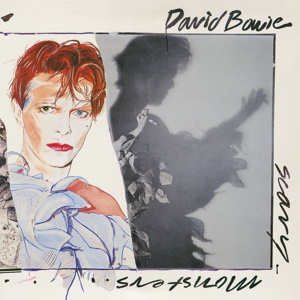
Scary Monsters (and Super Creeps), also known simply as Scary Monsters, is the fourteenth studio album by the English musician David Bowie, released on 12 September 1980 through RCA Records. His first album following the Berlin Trilogy (Low, "Heroes" and Lodger), Scary Monsters was Bowie's attempt at creating a more commercial record after the trilogy proved successful artistically but less so commercially.
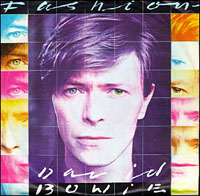
"Fashion" is a song by the English musician David Bowie from his 14th studio album Scary Monsters (1980). Co-produced by Bowie and Tony Visconti and recorded from February to April 1980 at New York and London, it was the last song completed for the album. Originating as a reggae parody titled "Jamaica", "Fashion" is a post-punk, dance and funk track structurally similar to Bowie's "Golden Years". King Crimson guitarist Robert Fripp contributed lead guitar.
"Joe the Lion" is a song by David Bowie in 1977 for the album "Heroes". It was produced by Bowie and Tony Visconti and features lead guitar by Robert Fripp.
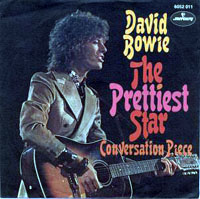
"The Prettiest Star" is a song by the English musician David Bowie, originally released on 6 March 1970 through Mercury Records as the follow-up single to "Space Oddity". A love song for his soon-to-be wife Angie, it was recorded in January 1970 at Trident Studios in London and featured Marc Bolan on guitar, who was brought on by the producer Tony Visconti. Despite praise from music journalists, the single flopped and failed to chart. Years later, Bowie rerecorded the track for his 1973 album Aladdin Sane. On this more glam rock influenced take with lyrics matching themes on the album, Mick Ronson recreated Bolan's guitar part almost note-for-note. The remake was more well-received.
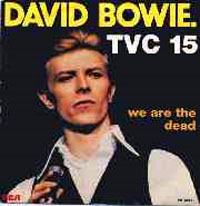
"TVC 15" is a song by the English musician David Bowie, released on his 1976 album Station to Station. RCA Records later released it as the second single from the album on 30 April 1976. The song was recorded in late 1975 at Cherokee Studios in Los Angeles. Co-produced by Bowie and Harry Maslin, the recording featured guitarists Carlos Alomar and Earl Slick, bassist George Murray, drummer Dennis Davis, pianist Roy Bittan and Warren Peace on backing vocals. The upbeat song is mostly art rock performed in a style reminiscent of the 1950s. Lyrically, the song concerns a character's girlfriend being eaten by a television set. It was inspired by a dream of Iggy Pop's and Bowie's role in The Man Who Fell to Earth (1976). Some lyrics are also influenced by the Yardbirds and Kraftwerk.

"Scary Monsters (and Super Creeps)" is a song by the English singer-songwriter David Bowie, released as the title track of his 1980 album Scary Monsters (and Super Creeps). It was also issued as the third single from that album in January 1981. Coming as it did in the wake of two earlier singles from Scary Monsters, "Ashes to Ashes" in August 1980 and "Fashion" in October the same year, NME critics Roy Carr and Charles Shaar Murray labelled its release another instance "in the fine old tradition of milking albums for as much as they could possibly be worth". The song was subsequently performed on a number of Bowie tours.
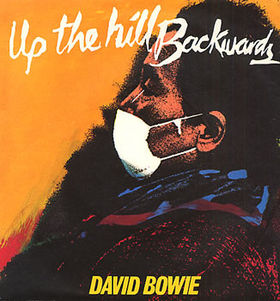
"Up the Hill Backwards" is a song by the English musician David Bowie, released on his 1980 album Scary Monsters . It was later issued by RCA Records as the fourth and final single from the album in March 1981. Originally written under the title "Cameras in Brooklyn", the song was recorded between February and April 1980 at the Power Station in New York City and Good Earth Studios in London. The recording features backing vocalists, guitar contributions from Robert Fripp and acoustic guitar played by co-producer Tony Visconti. Lyrically, the song concerns the struggles of facing a crisis, partially influenced by Bowie's divorce from his wife Angie. Musically, the song contains numerous time signature changes and a Bo Diddley-inspired beat.
"Black Country Rock" is a song by the English musician David Bowie, released on his 1970 album The Man Who Sold the World. The song was recorded in May 1970, with sessions taking place at Trident and Advision Studios in London. The lineup featured Bowie on lead vocals, guitarist Mick Ronson, bassist/producer Tony Visconti, drummer Mick Woodmansey and Ralph Mace on Moog synthesiser. The track was mostly composed by Ronson and Visconti, who developed it using a basic song sketch from Bowie. Labelled under the working title "Black Country Rock", Bowie used the title to write the lyrics towards the end of the sessions, resulting in a repeated two-line verse and chorus. A blues rock and hard rock number, Bowie imitates T. Rex's Marc Bolan in his vocal performance.
"After All" is a song written by the English singer-songwriter David Bowie in 1970 for the album The Man Who Sold the World, released later that year in the United States and in April 1971 in the UK. One of a number of Bowie songs from the early 1970s reflecting the influence of Friedrich Nietzsche and Aleister Crowley, it has been described by biographer David Buckley as "the album's hidden gem", and by Nicholas Pegg as "one of Bowie's most underrated recordings".
"Watch That Man" is a song by the English musician David Bowie, the opening track on the album Aladdin Sane from 1973. Its style is often compared to the Rolling Stones' Exile on Main Street. The mix, in which Bowie's lead vocal is buried within the instrumental sections, has generated discussion among critics and fans.
"Cracked Actor" is a song by the English musician David Bowie, released on his sixth studio album Aladdin Sane (1973). The track was also issued as a single in Eastern Europe by RCA Records in June that year. The song was written during Bowie's stay in Los Angeles during the American leg of the Ziggy Stardust Tour in October 1972. Co-produced by Bowie and Ken Scott, it was recorded in January 1973 at Trident Studios in London with his backing band the Spiders from Mars – comprising Mick Ronson, Trevor Bolder and Woody Woodmansey. A hard rock song primarily led by guitar, the song describes an aging Hollywood star's encounter with a prostitute, featuring many allusions to sex and drugs.
"Lady Grinning Soul" is a song by the English musician David Bowie, released on the album Aladdin Sane in 1973. It was a last-minute addition, replacing the "sax version" of "John, I'm Only Dancing" as the closing track. The composer's first meeting with American soul singer Claudia Lennear in 1972 is often cited as the inspiration for the song. In 2016, after Bowie's death, an interview with Lennear revealed that Bowie called her in 2014, and told her the song had been written about her.
"Big Brother" is a song written by David Bowie in 1973 and intended for his never-produced musical based on George Orwell's Nineteen Eighty-Four. In 1974 it was released on the album Diamond Dogs. It segued into the final track on the record, "Chant of the Ever Circling Skeletal Family".
"Fascination" is a song written by the English singer-songwriter David Bowie and the American musician Luther Vandross for Bowie's Young Americans album in 1975. The song originated from a Vandross song called "Funky Music " which The Mike Garson Band used to play before Bowie concerts in 1974.

"Stay" is a song by the English musician David Bowie, released on his 1976 album Station to Station. The song was recorded in late 1975 at Cherokee Studios in Los Angeles. Co-produced by Bowie and Harry Maslin, the recording featured guitarists Carlos Alomar and Earl Slick, bassist George Murray, drummer Dennis Davis, pianist Roy Bittan and Warren Peace on percussion. The track features prominent dual guitar work from Slick and Alomar, who mostly composed it in the studio. Based on the chord structure of "John, I'm Only Dancing (Again)", a funk reworking of "John, I'm Only Dancing" (1972), "Stay" emulates funk rock, soul and hard rock. The song's lyrics are abstract and relate to love.
"Blackout" is a song written and recorded by David Bowie in 1977 for the album "Heroes". Author Nicholas Pegg described the track as "typical of the darkly exhilarating sonic schizophrenia of the "Heroes" album", while biographer David Buckley remarked on "a backing verging on industrial". Regarding its lyrics and subject matter, Bowie himself said in 1999 that the song "did indeed refer to power cuts. I can't in all honesty say that it was the NY one [New York City blackout of 1977], though it is entirely likely that that image locked itself in my head."

"Look Back in Anger" is a song written by English artists David Bowie and Brian Eno for the album Lodger (1979). It concerns "a tatty 'Angel of Death'", and features a guitar solo by Carlos Alomar.
"It's No Game" is a song written by English musician David Bowie for his 1980 album Scary Monsters , featuring lead guitar played by Robert Fripp. The song is split into two parts, opening and closing the album. "(No. 1)" is musically sinister, featuring Bowie screaming lyrics and Japanese narration provided by actress Michi Hirota. "(No. 2)", a stark contrast to "(No. 1)", is much calmer, which Bowie's biographers symbolise as Bowie facing the same situation in "(No. 1)", but after the album's duration.
"Scream Like a Baby" is a song written and performed by David Bowie. It appears on the 1980 album Scary Monsters .
References
- ↑ Sheffield, Rob (18 August 2016). "Rob Sheffield on David Bowie's Essential Albums". Rolling Stone . Retrieved 4 August 2019.
- 1 2 O'Leary 2019, chap. 4.
- ↑ Doggett 2012, pp. 377–380.
- 1 2 Pegg 2016, pp. 277–278.
- ↑ Buckley 2005, pp. 322–323.
- ↑ Carr & Murray 1981, pp. 108–114.
- ↑ Chris O'Leary (19 Feb 2019). "Teenage Wildlife: inside the song about Bowie's midlife crisis". The Guardian .
- ↑ Currie, David, ed. (1985). David Bowie: The Starzone Interviews. London: Omnibus Press.
- ↑ Buckley, David (1999). Strange Fascination. London: Virgin. pp. 363–375.
- ↑ MacKinnon, Angus (September 1980). "The Future Isn't What it Used to Be". NME .
- ↑ Smash Hits flexi-disc, 1985 Boy George interview
Sources
- Carr, Roy; Murray, Charles Shaar (1981). Bowie: An Illustrated Record. London: Eel Pie Publishing. ISBN 978-0-380-77966-6.
- Buckley, David (2005) [1999]. Strange Fascination – David Bowie: The Definitive Story. London: Virgin Books. ISBN 978-0-7535-1002-5.
- Pegg, Nicholas (2016). The Complete David Bowie (revised and updated ed.). London: Titan Books. ISBN 978-1-78565-365-0.
- Doggett, Peter (2012). The Man Who Sold the World: David Bowie and the 1970s. New York City: HarperCollins Publishers. ISBN 978-0-06-202466-4.
- O'Leary, Chris (2019). Ashes to Ashes: The Songs of David Bowie 1976–2016. London: Repeater. ISBN 978-1-912248-30-8.